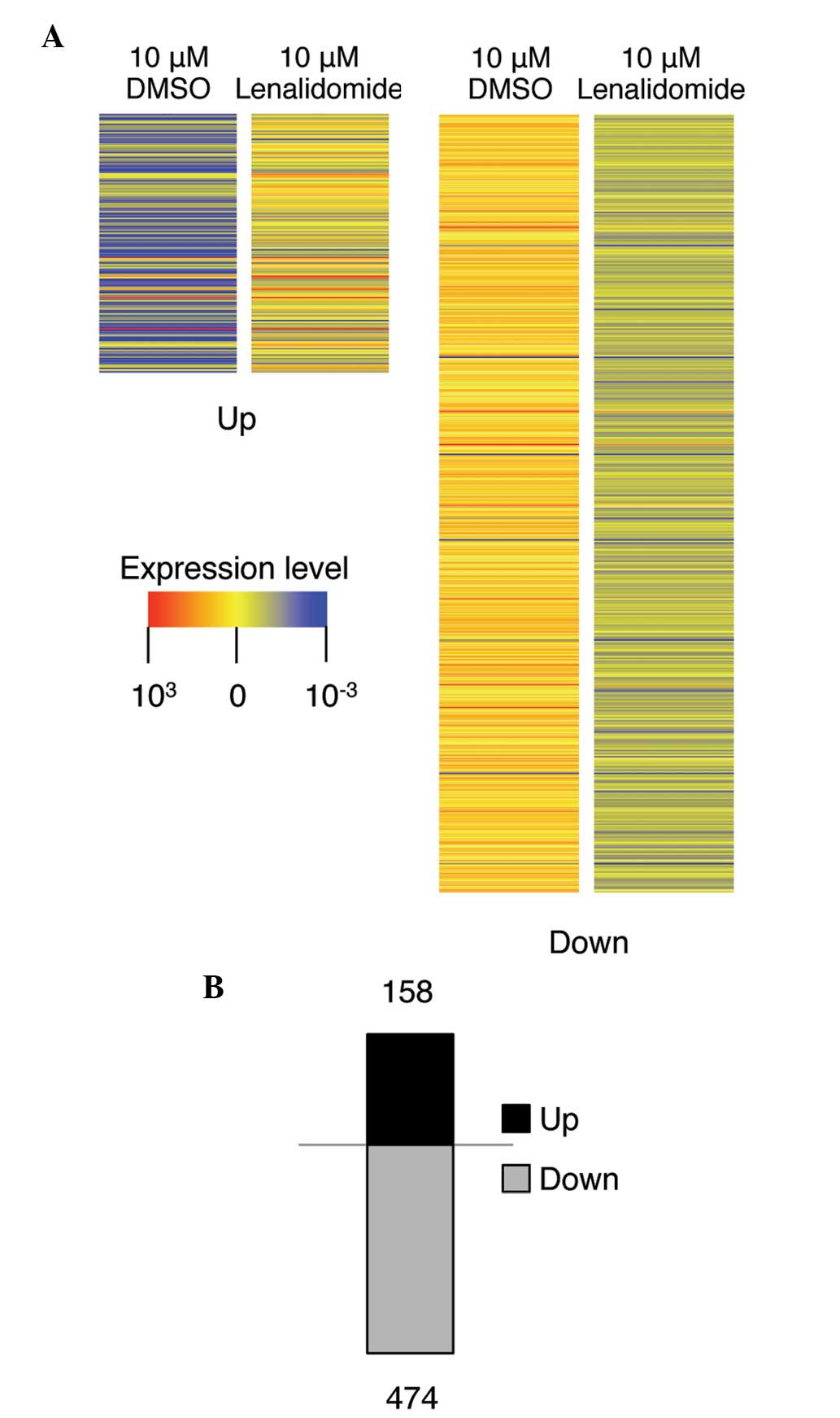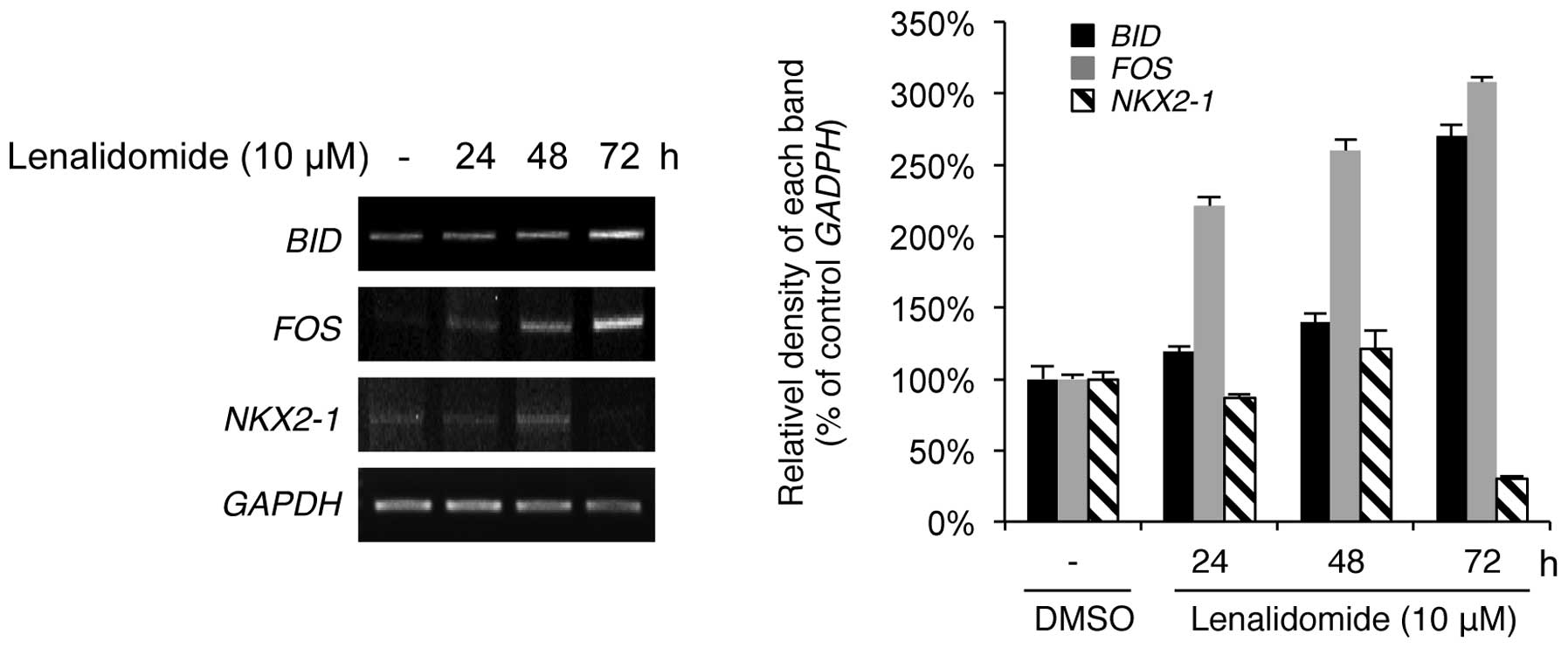|
1.
|
Ferlay J, Shin HR, Bray F, et al: GLOBOCAN
2008, Cancer incidence and mortality worldwide. IARC CancerBase No.
10. Lyon, France: International Agency for Research on Cancer;
2010, http://globocan.iarc.fr.
|
|
2.
|
American Cancer Society: 2010 Cancer facts
and figures. Atlanta, GA: American Cancer Society; 2010
|
|
3.
|
Herbst RS, Heymach JV and Lippman SM: Lung
cancer. N Engl J Med. 359:1367–1380. 2008. View Article : Google Scholar : PubMed/NCBI
|
|
4.
|
List A, Kurtin S, Roe DJ, et al: Efficacy
of lenalidomide in myelodysplastic syndromes. N Engl J Med.
352:549–557. 2005. View Article : Google Scholar : PubMed/NCBI
|
|
5.
|
Hideshima T, Richardson PG and Anderson
KC: Current therapeutic uses of lenalidomide in multiple myeloma.
Expert Opin Investig Drugs. 15:171–179. 2006. View Article : Google Scholar : PubMed/NCBI
|
|
6.
|
Eisen T, Trefzer U, Hamilton A, et al:
Results of a multicenter, randomized, double-blind phase 2/3 study
of lenalidomide in the treatment of pretreated relapsed or
refractory metastatic malignant melanoma. Cancer. 116:146–154.
2010.
|
|
7.
|
Kalmadi S, Davis M, Dowlati A, et al:
Phase I trial of three-weekly docetaxel, carboplatin and oral
lenalidomide (Revlimid) in patients with advanced solid tumors.
Invest New Drugs. 25:211–216. 2007. View Article : Google Scholar : PubMed/NCBI
|
|
8.
|
Miller AA, Case D, Harmon M, et al: Phase
I study of lenalidomide in solid tumors. J Thorac Oncol. 2:445–449.
2007. View Article : Google Scholar : PubMed/NCBI
|
|
9.
|
Dahut WL, Aragon-Ching JB, Woo S, et al:
Phase I study of oral lenalidomide in patients with refractory
metastatic cancer. J Clin Pharmacol. 49:650–660. 2009. View Article : Google Scholar : PubMed/NCBI
|
|
10.
|
Bartlett JB, Tozer A, Stirling D and
Zeldis JB: Recent clinical studies of the immunomodulatory drug
(IMiD) lenalidomide. Br J Cancer. 93:613–619. 2005. View Article : Google Scholar : PubMed/NCBI
|
|
11.
|
Tohnya TM, Ng SS, Dahut WL, et al: A phase
I study of oral CC-5013 (lenalidomide, Revlimid), a thalidomide
derivative, in patients with refractory metastatic cancer. Clin
Prostate Cancer. 2:241–243. 2004. View Article : Google Scholar : PubMed/NCBI
|
|
12.
|
Gupta D, Treon SP, Shima Y, et al:
Adherence of multiple myeloma cells to bone marrow stromal cells
up-regulates vascular endothelial growth factor secretion:
therapeutic applications. Leukemia. 15:1950–1961. 2001. View Article : Google Scholar
|
|
13.
|
Teo SK: Properties of thalidomide and its
analogues: implications for anticancer therapy. AAPS J. 7:E14–E19.
2005. View Article : Google Scholar : PubMed/NCBI
|
|
14.
|
Corral LG, Haslett PA, Muller GW, et al:
Differential cytokine modulation and T cell activation by two
distinct classes of thalidomide analogues that are potent
inhibitors of TNF-alpha. J Immunol. 163:380–386. 1999.PubMed/NCBI
|
|
15.
|
Dredge K, Marriott JB, Todryk SM, et al:
Protective antitumor immunity induced by a costimulatory
thalidomide analog in conjunction with whole tumor cell vaccination
is mediated by increased Th1-type immunity. J Immunol.
168:4914–4919. 2002. View Article : Google Scholar : PubMed/NCBI
|
|
16.
|
Bartlett JB, Dredge K and Dalgleish AG:
The evolution of thalidomide and its IMiD derivatives as anticancer
agents. Nat Rev Cancer. 4:314–322. 2004. View Article : Google Scholar : PubMed/NCBI
|
|
17.
|
Verhelle D, Corral LG, Wong K, et al:
Lenalidomide and CC-4047 inhibit the proliferation of malignant B
cells while expanding normal CD34+ progenitor cells. Cancer Res.
67:746–755. 2007.PubMed/NCBI
|
|
18.
|
Kotla V, Goel S, Nischal S, et al:
Mechanism of action of lenalidomide in hematological malignancies.
J Hematol Oncol. 2:362009. View Article : Google Scholar : PubMed/NCBI
|
|
19.
|
Li S, Pal R, Monaghan SA, et al: IMiD
immunomodulatory compounds block C/EBP{beta} translation through
eIF4E down-regulation resulting in inhibition of MM. Blood.
117:5157–5165. 2011.PubMed/NCBI
|
|
20.
|
Lopez-Girona A, Heintel D, Zhang LH, et
al: Lenalidomide down-regulates the cell survival factor,
interferon regulatory factor-4, providing a potential mechanistic
link for predicting response. Br J Haematol. 154:325–336. 2011.
View Article : Google Scholar : PubMed/NCBI
|
|
21.
|
Puthalakath H and Strasser A: Keeping
killers on a tight leash: transcriptional and post-translational
control of the pro-apoptotic activity of BH3-only proteins. Cell
Death Differ. 9:505–512. 2002. View Article : Google Scholar : PubMed/NCBI
|
|
22.
|
Durchdewald M, Angel P and Hess J: The
transcription factor Fos: a Janus-type regulator in health and
disease. Histol Histopathol. 24:1451–1461. 2009.PubMed/NCBI
|
|
23.
|
Chhieng DC, Cangiarella JF, Zakowski MF,
Goswami S, Cohen JM and Yee HT: Use of thyroid transcription factor
1, PE-10, and cytokeratins 7 and 20 in discriminating between
primary lung carcinomas and metastatic lesions in fine-needle
aspiration biopsy specimens. Cancer. 93:330–336. 2001. View Article : Google Scholar
|
|
24.
|
Tanaka H, Yanagisawa K, Shinjo K, et al:
Lineage-specific dependency of lung adenocarcinomas on the lung
development regulator TTF-1. Cancer Res. 67:6007–6011. 2007.
View Article : Google Scholar : PubMed/NCBI
|
|
25.
|
Kwei KA, Kim YH, Girard L, et al: Genomic
profiling identifies TITF1 as a lineage-specific oncogene amplified
in lung cancer. Oncogene. 27:3635–3640. 2008. View Article : Google Scholar : PubMed/NCBI
|
|
26.
|
Winslow MM, Dayton TL, Verhaak RG, et al:
Suppression of lung adenocarcinoma progression by Nkx2-1. Nature.
473:101–104. 2011. View Article : Google Scholar : PubMed/NCBI
|

















